Deke Leonard - A Tribute
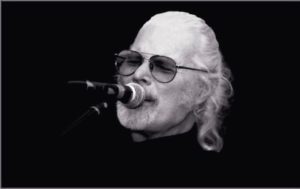
Deke Leonard is without doubt one of the best songwriters and musicians to have come out of Wales. As a member of the legendary ‘Welsh wizards’ Man, his own band Iceberg, and as a solo artist, he has left a legacy of songs and never forgotten performances, that speak to why rock music is so formatively and emotionally important, in so many people’s lives. Not least for this writer.
My hope is that in reading this tribute, you will feel moved to seek out Deke’s music and books.
Sadly we lost Deke in January of this year. His legacy and life were celebrated at the Princess Royal Theatre in Port Talbot on the 10 June, with some excellent bands playing a selection of his songs, from across an amazing career. It was topped with an electrifying performance by Son of Man, and some wonderful words from Mary his partner. More of that later.
I first heard Deke as part of the classic Man line up, including the great Micky Jones on guitar, Terry Williams on drums, and Martin Ace on bass, on the Live At The Padget Rooms Penarth album. The album was playing in the sixth form school common room, and I was immediately hooked by the intricate and melodic guitar work, great songs, and dazzling musical arrangements, that spoke to the great west coast bands from the United States, such as the Jefferson Airplane and Quicksilver Messenger Service. There was something else Man had though, that added a special ingredient to their sound. Which for me was a quintessential Welsh romanticism, expressed in many of the lyrics, particularly Deke’s, and the sometimes choral like atmospheric musical arrangements. Together of course, with the acute sense of comradeship amongst the band members, that seem to imbue every note they played.
With my brother, I then had the privilege to hear the band play three times at the iconic Glasgow Apollo venue. The line ups changed at each concert (a characteristic of the family of musicians ethos the band had, with musicians leaving and rejoining). Common though to each of the Glasgow shows were the core players of Deke, Micky and Terry. Their inspired improvisational playing combined with great songwriting, felt completely transcendent. They were that good; and as a teenager, newly discovering the musical and creative heights rock music could aspire to, it was an absolute joy to experience.
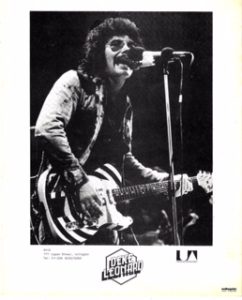
What struck me about Deke at those concerts, was his ability to drive with his guitar and voice, in the most exciting way, and with real swing, a hard edged rock song like his “A Hard Way to Live”. While also offering a more gentle side, playing the electric piano on stage, and leading the band so soulfully and poignantly, through his song ‘Hard Way To Die’. Deke was so exciting to watch, and looked to be so completely in the moment, with his singing and playing. You couldn’t take your eyes off him. Moreover, the guitar partnership between Deke and Micky seemed to be so intuitive and sympathetic to each other’s playing, especially so in the longer pieces like C’mon and Bananas, where their playing seemed to just fly.
My brother and I listened constantly to Deke’s early solo albums Iceberg and Kamikaze. They were filled with such great songs, some of which of course made their way into the Man repertoire, The sublime musicianship on the albums was delivered with friends from Man and Help Yourself, amongst many other great musicians. A song like Broken Ovation from the Iceberg album, speaks to Deke’s melodic songwriting abilities, together with his trademark and inventive wah-wah guitar refrains, and cool expressive vocals. The lyrics tell a hard boiled story of betrayal, creating a mood not unlike a Dashiell Hammett novel, which feels very much Deke. 7171-551 from the same album, that became a staple of Man’s live set when Deke re-joined the band, is a high octane guitar workout, with one of Deke’s most lyrical lead guitar solos.
I have a number of absolute favourite moments of Deke on record. The version of Deke’s rocker Daughter of the Fireplace on the Man album Live At The Padget Rooms Penarth album, gets stretched out musically, giving Deke and Micky’s guitars full reign; and at one point Deke leads the band into a Crosby, Stills and Nash type harmony section. It’s spine tingling stuff! From the same album, Deke introduces Many Are Called But Few Get Up, with the iconic words “Play it like it is man”. A beautiful shimmering guitar introduction from Deke and Micky leads into some blistering ensemble playing by the band, that sees them better the psychedelic influenced sound of their West Coast heroes.
Then there is the astonishing15 minute guitar tour de force where Deke joins Help Yourself and BJ Cole on his song Eddie Waring, on the live Christmas at the Patti album. In turn Richard Treece, BJ Cole and Malcolm Morley take their solos, each layering something unique musically onto the song. Then Deke’s wah-wah drenched guitar starts to gear up, and when his solo is unleashed, it just soars and cries, with waves of emotion pouring out of his playing. A fabulous accompanying dual vocal from Malcolm and Deke, shows how musically in tune these guys were with each other.
Deke was not just all of the things mentioned, but also a gifted writer, who in his books brought alive the joys of rock music, and the accompanying lifestyle, with humour, warmth, and a gentle care for fellow musicians and friends. Highly recommended as a starting point is Rhinos, Winos and Lunatics: The Legend of Man, a Rock’n’Roll Band. It tells the story of the Man band from its beginnings, to the end of the first phase of the band in 1976. It’s a book that offers a warm and empathic insight into the life of a Rock and Roll band with bags of musical ambition, who negotiate all the ups and downs of the music business with wit and style. With Deke’s wonderful storytelling voice, it is simply impossible to put down.
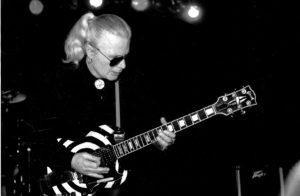
The Memorial Concert
The memorial concert for Deke in Port Talbot was titled aptly “Why do they always take the good ones”. Musicians, including many that have played with Deke, together with family, friends, and fans, all came together to celebrate Deke’s life, his music, and what he had meant to them personally. In tribute, all the bands played songs from Deke’s back catalogue, as well as their own songs.
The highlight was without doubt the final set, where Son of Man led by the very gifted guitarist George Jones (son of Micky), played a set entirely made up of songs written by Deke, together with some Man favourites. Though a special mention must also go to Alan ‘Tweke’ Lewis, formerly of Man, playing with The Pollen Count, who led a fantastic version of Man’s Ain’t There A Fight.
Opening up with Deke’s 7171-551 from the Iceberg album, Son of Man played in the most inspired way, while also paying attention to the artistry and musicianship at the heart of these great songs. The Ride and the View saw George bring out Deke’s Gibson guitar with the iconic black circles to great applause. A stirring version of the Man classic Bananas is resplendent with the late Phil Ryan’s keyboard solos played beautifully by Marco James.
The evening wouldn’t have been complete without Spunk Rock, the final number of a great set. George in a really moving moment says to the audience….”We will keep playing these songs!“
As the evening draws to a close Mary joins the guys on stage to thank all the musicians for an evening that has done Deke and his legacy proud. In a very special moment she and the musicians face the audience arms around each other’s shoulders, with Mary at the centre. In that moment it feels like Deke is in the venue with us, through the memories and hearts of everyone there.
Meeting Deke
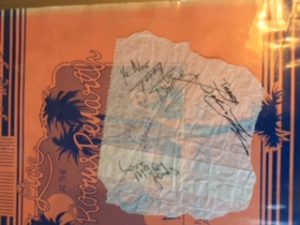
I was lucky enough as a wide eyed teenager to meet Deke. On the second occasion my brother and I saw Man, they were playing with the legendary John Chippolina of Quicksilver Messenger Service, at the Glasgow Apollo. This was a big Glasgow venue holding 3000 people, which Man were easily able to pack out. My brother and I decided we would….ahem..bunk off school…and try and find the band in their dressing room, and get their autographs. So in the afternoon we found a side entrance where the equipment was being unloaded, sneaked in past the roadies, and tried to find our way through the labyrinth that was the backstage area of the Apollo.
We were saved from getting lost by hearing some lyrical Welsh accents, and we eventually found the band’s dressing room. We sat down with the guys, but were so incredibly nervous we couldn’t say one word to them. I do remember Deke smiling at us and saying hello, and then I knew it was okay for us to stay. After a little time, I plucked up the courage to ask for autographs. However, all I had was a paper bag we had sweeties in, so that had to make do.
Deke took it first, smiled again and signed, and then generously passed it around the rest of the band to sign their names. When we left the dressing room we were walking on air! I still have the autographs on the sweetie paper (pictured). Deke’s smile and kindness that afternoon has stayed with me ever since. So thank you Deke from my teenage self, you made it a very special day I have truly never forgotten.
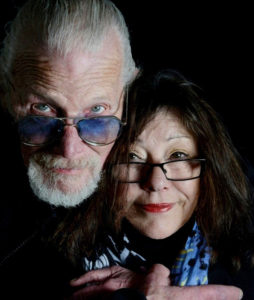
Interview with Mary
Deke’s partner Mary very kindly consented to share some personal reflections about Deke and their story, and very generously replied to some questions we asked. Mary also wonderfully supplied the photos featured here. I am very grateful and feel immensely privileged by the thoughtfulness, care and time Mary has put into this. It is a moving and captivating story, and also a wonderfully informative capturing of the music scene in Wales in the 1960s and 1970s.
The photo at the head of Mary’s reflections is of Mary and Deke together.
Sonic Bandwagon: How did you and Deke meet?
Mary: I first met Deke when I was 10 years old when my brother Keith, a drummer, joined Deke’s first band, Lucifer & The Corncrackers. They were already local South Wales celebrities by that time and, alongside The Bystanders, The Mustangs (later Eyes of Blue) and The Ivies (later Badfinger) were known as one of the best bands on the scene. I was very lucky in that my parents embraced the ‘cultural revolution’ in the early 60s. We had a shop in the town next door to The Falcon Music Shop where all the local budding bands and musicians gathered to buy their first guitars and amps and the latest imports from the U.S. And my Mum and Dad threw themselves with gusto into helping all the young musicians. The Corncrackers lasted from about 1963 to 1967 with a couple of breaks in between! The back room of our shop was the meeting and rehearsal room and, in fact, Deke writes about my mother and father and myself in his book about the period ‘Maybe I Should’ve Stayed In Bed’.
It’s important to understand that the whole culture and everyone’s social life centred around the music scene which was the focal point of the local news columns every week. There were so many bands that there was a sense of ‘family’ and great camaraderie between all the musicians. As a youngster, I was caught up in all this. And, being a ‘little sis’ as Deke used to call me then, I was allowed on certain gigs if my Dad was driving the band. Also, The Corncrackers had their own club – The ‘L’ Club and when they had gigs in other parts of Wales, they used to hire class performers like Johnny Kidd and the Pirates or Tommy Woodward (later Tom Jones) and the Senators to play at The ‘L’ Club. So again, I was lucky enough to see many famous rock’n’rollers during my teens, not just in the local ballroom, called The Glen, but also in The Corncrackers Club.
When Deke joined The Bystanders which became Man, our ways parted. Although we both ended up in London, we only saw each other on rare occasions, gigs mainly, and then, when Deke went solo in the mid 70s my brother joined him again in Deke Leonard’s Iceberg, and so I saw a lot of him during that period, visiting Rockfield Studios when they were recording Kamakaze and attending Iceberg gigs.
When Deke rejoined Man things went on as before, meeting on rare occasions at gigs etc. and so it went on for the next twenty years until an old friend and ex Corncrackers road manager, Allan Lewis arranged a Corncrackers reunion in his club in Llanelli which they all agreed to do. That was 1992. All the old names and faces converged at the reunion including myself. And, don’t ask me what happened, but suddenly, Deke and I fell in love! It was very weird but exciting and wonderful. And I think I’ll let Deke explain it in his own words from his book ‘Maximum Darkness- Man On The Road To Nowhere’:
“Then came the most momentous gig I’ve ever played. The ‘Corncrackers’ reunion in Bailey’s Club in Llanelli with Keith and Wes. Mary, drummer Keith’s sister, had come down from London….In the immortal words of John Wayne’s Ghenghis Khan upon seeing Susan Hayward for the first time in The Conqueror, “I must have this Tartar woman for my own.” We found ourselves sitting opposite each other at a communal table. We talked about old times and what we’d been up to during the intervening years. By the end of the conversation we’d fallen head-over-heels in love with each other, which surprised the fuck out of everyone, not least the two principals. It was the beginning of a perfect romance that would only end when I breathe my last breath, placing us among a pantheon of the great romances of fact and fiction, right up there with Romeo and Juliet, Antony and Cleopatra, Harlequin and Columbine, Burton and Taylor, John and Yoko and Pinky and Perky. We moved in together and embarked on a life of perpetual bliss. And perpetual bliss it was for the next 24 plus years with never a cross word between us – soul-mates always”.
Sonic Bandwagon: What inspired Deke most as a musician and a writer?
Mary: This is a really difficult question to answer as there are so many things in Deke’s world which inspired him over his lifelong career as a musician and writer. Mainly though, it was just life in general – all the ups and downs, pitfalls, angst, luck, fate, politics, love, loss, humour, past and present experiences. However, at the very beginning he was inspired by what all the budding musicians were at the beginning of the 60s. If you listen to the answers to the same question posed to Keith Richards or the late John Lennon you will hear the same story that Deke would tell you – it was the explosive impact of American rock’n’roll music arriving in the U.K. spawning a whole new era of individualism, youth culture and social change – Elvis Presley, Eddie Cochran, Gene Vincent, Little Richard, Chuck Berry, Buddy Holly, The Everly Brothers and British bands like Johnny Kidd & The Pirates followed by the blues artists like Willie Dixon, Big Bill Broonzy , Robert Johnson, Howlin’ Wolf, John Lee Hooker and Bo Diddley. Deke’s initial inspiration for his guitar playing came from Elvis’s guitarist, the great Scotty Moore, who we were lucky enough to meet about 15 years ago. Deke told Scotty that he was the reason he became a guitarist, to which Scotty Moore replied ‘Gee, it’s my fault again’. As the era shifted from rock’n’roll and rhythm and blues towards more experimental music - psychedelia, prog rock and west coast - Deke became a big fan of the likes of Frank Zappa & The Mothers of Invention, Captain Beefheart, Stevie Miller, Little Feat, The Band and Touch, whilst the blues remained a constant, especially Robert Johnson who Deke adored. I have to say though, Deke’s listening was extremely eclectic. His vast and diverse collection includes just about every musical genre that exists including classical, like Bach and Gershwin. If you listen to Deke’s solo albums, you’ll find a mix of genres in there too – from good old rock’n’roll , R & B, west coast, the blues, a bit of Nashville – it’s all there. He was as much at ease writing 10 minute spacey rock anthems as he was the three-minute ballad or commercial song
Although taking on board certain influences was inevitable I wouldn’t say that he was as much inspired by what he listened to as to what was within himself, if that makes sense. Deke could write a song on a train with a brass band playing in the next carriage and he began writing songs as early as 1963. (Some of which were recorded in our house on an old Grundig). Always with a note-book to hand, Deke’s mind was in a perpetual state of composing mostly inspired by, as aforesaid, observations and life experiences. There are hundreds of notebooks full of songs and sections of lyrics jotted down as he thought of them throughout the day, whatever we were doing. There wasn’t a day went by he didn’t compose or write something, even if it was just a line of two of lyric.
I can say the same about Deke’s writing. He was a born writer and an avid reader all his life. He also adored the radio (which he took everywhere with him) and especially the programmes ‘Just A Minute’ and ‘Give Us A Clue’ and his beloved cricket. Deke didn’t really look to other writers for inspiration, certainly not consciously anyway. He was a natural writer from an early age, always jotting down his experiences whether it be a holiday journal, tour diary, lyrics, or just notes on ideas that would suddenly pop into his head or political or social issues. He always wrote the sleeve notes for the albums and spent some time writing features and reviews for several music magazines in the 70s and 80s.
When The Welsh Connection, the Man fanzine, began in the 80s and the band was touring regularly in the UK and Europe, Deke was asked by the publisher, Michael Heatley, to write a humorous ‘on-the-road’ diary of the tours, gigs and recording sessions called ‘Deke Speaks’. (In fact, a collection of these have been published on Kindle). This became so popular that a book was called for, so Michael persuaded Deke to write his first full-length biographical book ‘Rhinos, Winos & Lunatics’ which met with great critical acclaim from all the major music magazines, so another three books followed. The most amazing thing, watching Deke write, was that he never ‘planned’ the book, never agonised over the next line or chapter, never made amendments, and was self-editing. That is a gift most writers would give their right arm for. As the music author and critic Charles Shaar Murray said in Classic Rock “I wish I could play guitar as well as Deke Leonard writes.”
Sonic Bandwagon: Is there an album or song that Deke recorded that he was particularly proud of?
Mary: I’m not sure that ‘proud’ would not be the right word in relation to Deke. Deke never suffered from ‘pride’ really. He was the most unassuming, humble person, as fellow band members, friends and fans testify. As Malcolm Morley said of him “he was a fine musician although he would never admit it”. Deke was happy and satisfied when his songs developed in the recording studio into a good final mix he was content with. There were particular songs that were close to his heart, and most of these became his signature numbers that he favoured performing live with Man, and his own band Iceberg. The list includes: Ride And The View; Razorblade & Rattlesnake; 7171 551; Map of India; In Search of Sarah and Twenty-Six Horses; A Hard Way To Die, Daughter Of The Fireplace; Day & Night; and A Hard Way To Live, to name but a few. I never heard Deke express dissatisfaction with any particular album or song because he knew exactly what he wanted in the studio and, as John ‘Pugwash’ Weathers said “he was the consummate professional”. There are some great songs on the album Deke had nearly finished recording before he passed away. The positive news is the album will be finalised soon and released posthumously this year.
For me, Deke’s success lay in the fact he managed to live his life doing what he loved and even though the mainstream eluded him due to fate intervening, testimonies in messages on his website prove he did inspire others. When at The Laugharne Weekend Festival on one occasion, where Deke featured annually with his one-man show, a young lad approached us and said to Deke “I bought your book The Twang Dynasty. I’m a young musician. When I read it, it made me go out and buy CDs by all the musicians you mention like the old blues artists. I learned such a lot from your book, it broadened my musical horizons and influences. Thank you“. I turned to Deke and said “There’s your success, a legacy.”.
Sonic Bandwagon: How did you feel watching Deke play on stage? Is there a particular performance that stands out for you?
Mary: This is a bit of a poser for me, because I could be in danger of sounding indifferent which is certainly not the case. Deke was an amazing musician and I loved hearing him play whether at a gig or at home. But my background has a bearing on this question. I grew up in a house full of music and musicians (including Deke!) I also worked for a time in the late 60s and 70s in the music business with major bands, then in the London theatres and in film with many known actors, and my first husband was a musician and I’ve done a bit of singing myself. So gigs were like home from home to me. Being at a gig with Deke was no different to sitting at home with him really. I confess I wasn’t an avid fan of the Manband in the early days, but they were old pals and, when on occasions I bumped into them at festivals or multi-band gigs I enjoyed watching their set as they were familiar to me. What always impressed me with the Manband was the energy they generated on stage. They were a phenomenal live band. And so was Iceberg. Deke and Micky were an amazingly charismatic partnership, guitar giants respectively, albeit different in style. However, I hadn’t seen Man for a while when Deke and I got together romantically, but thereafter went to the occasional gig and, when I was able, I loved watching Deke play simply because I loved the fact he was in his element. I say “when I was able” because at gigs I’d usually find myself caught up in something or other, and the music would be like a backdrop to whatever that would be! On the occasions I could pay attention and listen to Deke play, sometimes he took my breath away. But then, he played guitar at home most days too as he was constantly composing. I don’t mean to sound flip about it, but music and musicians had always been my world so I was never, so to speak, in awe. But Deke was an amazing musician and electrifying on-stage whilst off-stage he was a laid-back, gregarious, humble, gentle, and funny softee. So he was well-balanced you could say!
There are many performances which are memorable but one in particular was at one of the The Welsh Convention gigs at Feltham Rox, London. I think it was 1993. I was helping out with the merchandise at the back of the hall. Deke was the only member of the band on stage - the others were taking a short break. So he began the slide intro to Ride And The View on the Gibson SG and carried on playing a great solo like a demon for twelve minutes or so before Micky, Martin, Terry and Pugwash ambled on stage. It was pretty astonishing and made me look up and listen. Lots of people comment on the fact that Deke had tremendous stage presence and when he began playing he could lift the atmosphere up a good few notches. This was true with whoever he was playing with, but he and Micky together were a phenomenon rarely seen or heard, a perfect and astonishingly gifted guitar partnership that we’ll probably never see the likes of again.
Sonic Bandwagon: What did the memorial concert in Port Talbot mean for you?
Mary: The memorial concert was held to celebrate Deke, with all those wonderful people who loved and supported him throughout his lifetime.
For the last few years of his life, Deke, as well as continuing to write, record and do his one-man performance, loved playing with Son of Man who are, as Deke always said “a bunch of sweethearts.” At Deke’s funeral, George (son of the late, great Micky Jones) said to me that he and the band, who had been Deke’s pall-bearers, would organise a memorial concert for Deke. I was pleased. There was a lot of love between them.
To be honest, I was in a very dark place then – and still am really. I don’t sleep much since Deke passed away and my daily rhythms are erratic to say the least. The week before the concert was no exception. I was an emotional wreck full of trepidation. When you lose your lover, best pal and soul-mate, who is your world, there’s no pain like it and no words to describe it.
But in reality I knew I could rely on our George to cherish Deke’s memory and make it a success. And he did. When George picked up Deke’s iconic Gibson, although tears rolled, my heart was bursting with love.
So, yes, it was deeply emotional but I had to take a deep breath because the event was about Deke. And about all the wonderful people who loved and supported him and his music for fifty plus years which Deke was always extremely conscious and respectful of. All the hundreds of tributes that poured in when he passed away paid homage to Deke not only as a fine musician but as a ‘lovely man’ ‘a gentleman’ who had ‘with time for everyone’. And I think this affection for Deke as a human being was also reflected in the atmosphere of warmth generated at the concert.
The memorial concert was also an opportunity for Son of Man and all the bands and musicians who played their hearts out, the crew and myself to say thanks to everyone for loving Deke and his music. So yes, it meant a lot to me and I can’t praise everybody enough who played their part, on stage and off, for doing Deke the honour of celebrating him by playing his songs, being there for him and participating, joyfully, in an evening of great musicianship and love.
PHOTO CREDITS:
- Mary & Deke by Doug Simpson
- Deke, black & white head shot - Keith Griffiths
- Deke in the 1970s with Telecaster - copyright UA
- Deke 1990s with Gibson on stage - Simon Thomas.

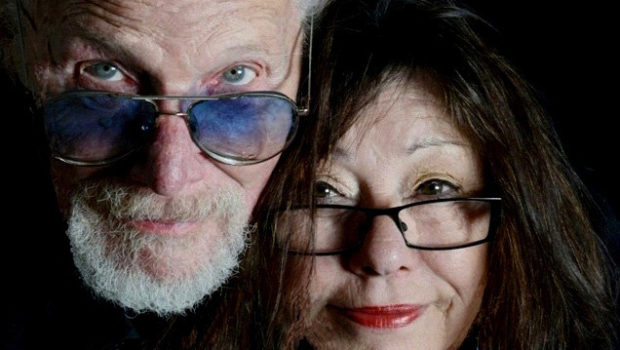





Beautifully written, thank you. Mary’s observation about Deke sharing the same influences as Keith Richards (et al) prompted a memory; I think that both Deke and Keith wrote that Scotty Moore’s playing on ” I’m left, you’re right, she’s gone” was the single greatest song / influence at the time. I can imagine the wit of the title appealing to Deke, too. Would it be a good idea to post this peice, or a link to it, on the Twang Dynasty site, so that more fans of Deke get a chance to read it ?
Great interview, really enjoyed it
What a superb article. A fitting tribute.
Thank You . .This is an amazing Tribute to Deke . ..once started I couldn’t stop till the end and to read Mary’s story was so touching. .. . Sam (compere at Deke’s Tribute Concert)
Wonderful to read Mary’s interview . I’m so glad he had her in his life .
I too, have been a lifelong fan of the Man band, Iceberg, and a host of other offshoot bands. I was lucky enough to see the Man band four times in Cheltenham, as a spotty teenager. I have fond memories of these gigs, and was overjoyed when I heard the band had reformed in 1992, not realising I’d missed out on 9 years prior to that date.
Following that “reunion” gig in Kentish Town supporting Ten Years After and Wishbone Ash, as I now lived 20 miles north of London, I was able to devote all my spare time following the 1983 line up, often seeing them play three times in one weekend. Hot sweaty nights in the Torrington, occurred on a monthly basis, and my wife and I got to know the band quite well, and developed a close community of fellow fans.
We now live in our dream home, 20 miles south of Cape Wrath, on a croft, growing vegetables, and keeping hens - living the good life, and had several conversations with Deke and Mary about some of her relatives who had a croft on Orkney.
And we still travel down to Swansea for Micky’s (and now Deke’s) annual memorial concert every December. It’s great to meet up with the man family each year.
It’s been a long ride, but what a view!..